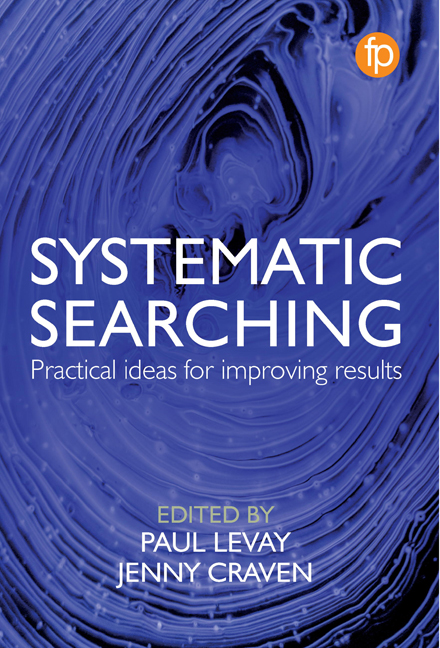Book contents
- Frontmatter
- Contents
- Figures, tables and case studies
- Contributors
- Acknowledgements
- Abbreviations
- Foreword
- 1 Introduction: where are we now?
- 2 Innovative approaches to systematic reviewing
- 3 Searching for broad-based topics
- 4 Choosing the right databases and search techniques
- 5 Gathering evidence from grey literature and unpublished data
- 6 Social media as a source of evidence
- 7 Text mining for information specialists
- 8 Using linked data for evidence synthesis
- 9 Evidence surveillance to keep up to date with new research
- 10 Training the next generation of information specialists
- 11 Collaborative working to improve searching
- 12 Communication for information specialists
- 13 The information specialist as an expert searcher
- 14 Conclusion: where do we go from here?
- Glossary
- Index
13 - The information specialist as an expert searcher
Published online by Cambridge University Press: 08 June 2019
- Frontmatter
- Contents
- Figures, tables and case studies
- Contributors
- Acknowledgements
- Abbreviations
- Foreword
- 1 Introduction: where are we now?
- 2 Innovative approaches to systematic reviewing
- 3 Searching for broad-based topics
- 4 Choosing the right databases and search techniques
- 5 Gathering evidence from grey literature and unpublished data
- 6 Social media as a source of evidence
- 7 Text mining for information specialists
- 8 Using linked data for evidence synthesis
- 9 Evidence surveillance to keep up to date with new research
- 10 Training the next generation of information specialists
- 11 Collaborative working to improve searching
- 12 Communication for information specialists
- 13 The information specialist as an expert searcher
- 14 Conclusion: where do we go from here?
- Glossary
- Index
Summary
Introduction
Information specialists play a key role in undertaking the searching for systematic reviews. This chapter traces the context, background and history of how the role has evolved over the last 20 years, before considering the challenges and debates facing today's expert searchers. Examples from the literature and practice will be used to highlight the debates before a summary of future directions for research and practice for expert searchers concludes the chapter.
The evolving role of the information specialist
Opportunities provided by evidence-based practice and systematic reviews
Evidence-based practice (EBP), with its emphasis on finding evidence, offered information specialists a wide range of opportunities for using and promoting their skills. For over 20 years, information specialists have been encouraged to undertake new roles and demonstrate their expertise within the EBP context (Falzon and Booth, 2001; Harris, 2005; McGowan and Sampson, 2005; Medical Library Association, 2005; Palmer, 1996). These roles have mainly focused on using traditional information skills in teaching others to find evidence and searching for evidence on behalf of others (both for individual patient care and within a systematic review context). There is some evidence of role development using critical appraisal, research and management skills and outreach roles (Brettle, 2009; Brettle and Urquhart, 2011).
The main focus of this chapter is on the role of the information specialist as an expert searcher within the context of systematic reviews. This role has been documented over time (Beverley, Booth and Bath, 2003; Spencer and Eldredge, 2018), although it has not been fully explored or evaluated.
Evidence-based practice itself has evolved from its origins in medicine, across health care to a means of decision-making in a wide range of other professions from librarianship (Koufogiannakis and Brettle, 2016) to policing (Sherman, 1998). The systematic review, although around since the 1970s, gained significant momentum in the late 1990s with interest from policymakers (Moher, Stewart and Shekelle, 2015) and organizations such as Cochrane (www.cochrane. org) and the Centre for Reviews and Dissemination (www.york.ac. uk/crd) and more recently the EPPI-Centre (http://eppi.ioe.ac.uk/cms), the Campbell Collaboration (www.campbellcollaboration.org) and the Joanna Briggs Institute (www.joannabriggs.org). The key feature of a systematic review is the use of formal and explicit methods which describe, at the outset, the question to be answered, the search for evidence and the assessment and synthesis of the evidence (Moher, Stewart and Shekelle, 2015).
- Type
- Chapter
- Information
- Systematic SearchingPractical ideas for improving results, pp. 269 - 288Publisher: FacetPrint publication year: 2018



